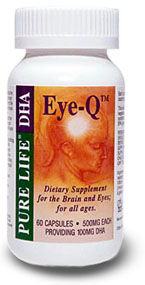 |
Eye - Q
"Consumption of omega-3 fatty acids may reduce the risk of coronary heart disease." If you’re like most people, you understand the importance of caring for your heart or caring for your teeth, but you probably don’t think about caring for your brain. It’s time to start. Your brain is arguably the most important, and certainly the most complicated, organ in the body. RBC now provides one simple way to help you give your brain the attention it deserves. The Importance of DHA DHA (Docosahexaenoic acid), an omega-3 long chain polyunsaturated fatty acid, is the primary building block of brain tissue. The brain is 60% fat, and DHA is the most abundant fatty acid in both the brain and the retina of the eye. It is absolutely essential for healthy brain and eye function. The importance of DHA can be seen clearly in the composition of human breast milk. DHA is the most abundant fatty acid in breast milk because it is essential for proper development of the baby’s brain, eyes, and nervous system. Low DHA levels are associated with behavior problems in children and neurological conditions in adults. The cells in the brain, retina, and other parts of the nervous system have connecting arms that transport electrical currents, sending messages throughout the body. DHA ensures the optimal composition of nerve cell membranes necessary for the most effective transmission of these signals. DHA is also important for maintaining a healthy heart and cardiovascular system.1 Why Supplement Our body synthesizes a small amount of DHA naturally, but we get most of our DHA through our diets; from fish, red meat, eggs and animal organ meats. However, in avoiding saturated fats, we have also lost the beneficial fats such as DHA. Today the average American’s diet is estimated to be 100 mg lower in DHA than it was 50 years ago. In fact, our nation has one of the lowest DHA levels in the world. Vegetarians and individuals on low-fat diets are particularly vulnerable to having a lower DHA level. Low levels of DHA have been correlated with changes in disposition, memory loss, and visual and other neurological conditions. This decline in the consumption of DHA has also led to an unhealthy imbalance between omega-3 fatty acids and the more plentiful omega-6 fatty acids. Eye-Q™ puts DHA back into your diet, helping you maintain healthy blood levels of this substance. A great deal of research has been conducted on omega-3 fatty acids recently which points to the fact that Eye-Q is much more than brain and eye support. Mood disorders have been successfully corrected with omega-3 supplementation.2 Atopic conditions such as asthma and allergies show improvement when omega-3s are added to the diet. 3,4 DHA has also been shown to demonstrate toxic effects on tumors in vitro.5 The positive effects of DHA supplementation are still being discovered as this exciting research continues. Neuromins™ DHA Fish are high in DHA because they consume microalgae, its original source and the source of DHA in Eye-Q™. Until recently, the primary supplemental source of DHA was fish oil. However, Royal BodyCare now provides Neuromins™ DHA, the only vegetarian source of DHA available. Unlike fish oils, Neuromins™ DHA does not contain eicosapentaenoic acid (EPA), which is not recommended for infants, children, and certain adults. Neuromins™ DHA is extracted under tightly controlled manufacturing conditions and is free of chemical pollutants that may be present in some fish oils. Benefit to New Mothers DHA in the diet is critically important for pregnant and nursing women. It is essential for proper brain and eye development in infants. Studies show that a decreased level of DHA in the brains of breast-fed babies have IQ advantages over babies fed formula without DHA. The inclusion of DHA in a child’s diet improves learning ability, whereas DHA deficiencies are associated with both learning and behavioral disorders.6 Unfortunately, DHA levels in the breast milk of U.S. women are among the lowest in the world. An additional 200 mg of DHA per day returns the breast milk of the average American mother to healthy levels. The DHA in Eye-Q capsules is so safe, it has been incorporated into infant formulas in Europe. Unfortunately, infant formulas sold in the United States do not currently contain this essential fatty acid. The World Health Organization (WHO) and the Food and Agricultural Organization of the United Nations have recommended that all pre-term and infant formulas contain DHA at levels found in breast milk. Daily Food for Your Brain Daily use of Eye-Q is intended to normalize the levels of DHA in your blood. Feed your brain and eyes with Eye-Q every day to keep them functioning at their peak for years to come. Item Code #1690 - $25.00 Suggested Use: Take one or two capsules per day. Each capsule contains: Algal oil 500 mg (DHA rich oil of vegetable origin yielding 100 mg DHA), high oleic sunflower oil, Vitamin C and Vitamin E as natural preservatives. Gelatin capsule. References: 1. Von Schacky, C et al. The effect of dietary omega-3 fatty acids on coronary atherosclerosis. A randomized, double-blind, placebo-controlled trail. Annals of Internal Medicine, 1999 April, 130:7, 554-62. 2. Stoll, AL et al. Omega-3 fatty acids and bipolar disorder. Prostaglandins Leukot Essential Fatty Acids, 1999 May, 60:5-6. 329-37. 3. Villani, F et al, Effect of dietary supplementation with polyunsaturated fatty acids on bronchial hyperreactivity in subjects with seasonal asthma. Respiration, 1998, 65:4, 265-9. 4. Kankaanpää, P et al. Dietary fatty acids and allergy. Annals of Medicine, 1999 Aug, 31:4, 2282-7. 5. Kafrawy, O et al. Docosahexaenoic acid in phosphatidylcholine mediates cytotoxicity more effectively than other omega-3 and omega-6 fatty acids. Cancer Lett, 1998 Oct, 132:1-2, 23-9. 6. Horrocks LA, et al. Health Benefits of docosahexaenoic acid (DHA). Pharmacol Research, 1999 Sept, 40:3, 211-25.
|